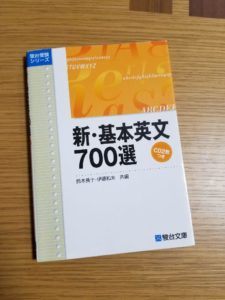日本の英語教育はとかく文法偏重と批判されますが、その反動なのか、読解・訳読・英文法中心の受験英語をやたら絶賛する人たちがいます。中高校で6年間も英語を習ったのにろくに英語ができないのは受験英語のせいではなく、受験英語をちゃんとマスターしていないからという主張をする人たちです。彼らによれば、受験英語をしっかり習得していれば正しい英語を書けるようになるし、多少慣れればすぐに英語をしゃべれるようになれるそうです。しかし、確かに英文法の習得は大事ですが、それだけで英文をスラスラ書けるようになるわけはありません。日本の英語教育はとかく「読み書き中心」と揶揄されますが、実際には「読み中心」であって、英語ライティングの指導はほとんどなされていません。受験英語をしっかりやれば読解力はそれなりにつきますが、ライティングに関しては生徒はおろか英語教師でさえろくにできないというのが実情です。にもかかわらず受験英語の支持者たちはいろんな「都市伝説」を作り上げて、受験英語を絶賛します。有名どころは、渡部昇一が広めた次の逸話です。
「自分の英語が通じないことに驚き、ルサンチマンを募られていった人たちとは正反対に、すばらしい英語で外国人の先生方を驚かせた経験を持つ人たちがいます。そんな経験は私にはあるし、また私の弟子たちにもあります。 外国へ行った当初は、相手に「バカか」と思われるくらい英語が通じない。そこで最初の驚きを経験するのは前者と同様ですが、半年か一年ぐらい経過すると、書いた英文のペーパーが向こうの学生たちよりずっと立派なものになっている。向こうの先生が「ほんとうにおまえが書いたのか」と訝るほどの出来栄えですから、”驚き”が今度は先生サイドの驚きに換わるわけです。」(渡部昇一著「英語の早期教育・社内公用語は百害あって一利なし」(p.73)
そんなわけはありません。日本の受験英語教育を絶賛したいがために作り上げたネタでしょう。受験英語で習う英文法や構文を完璧に習得しても、ネイティブレベルの英文を書けるようになりません。第一に受験英語レベルでは「冠詞+名詞」の用法(可算名詞と不可算名詞、名詞の単数と複数、定冠詞と不定冠詞の使い分け)がほとんど習得できません。しかし冠詞の用法がわからなければ正しい英語は書けません。第二に英語特有のライティングスタイルを受験英語では習いません。例えば、英語ライティングでは日本語と異なり同じ単語が繰り返して出てくることを嫌うため、パラフレーズ(paraphrase、言い換え)をして英文を書かないと幼稚な文章という印象を与えます。一例ですが、逆接の接続詞を使わないといけない箇所がbutばかりだと文章が野暮ったく見えます。そのため、although, however, nevertheless, nonetheless, on the other hand, still, though, albeitなどの単語も使うことで知的な印象を与えます。特にhoweverは文頭、文中、文末のどの位置でも使えるので重宝しますが、受験英語でパラフレーズの指導がされることはありません。第三に受験英語ではややこしい、複雑な、わかりにくい英文を読んで理解できる能力をつけることに専念するため、英語ライティングでは明確で、簡単で、わかりやすい英文が好まれることが教えられず、分かりやすいシンプルな英文を書く指導もなされません。これではネイティブの先生を唸らせるほどの名文を英語で書けるようになるわけがありません。受験英語で習得した英文法力はたしかに英語ライティングに役立ちますが、それだけでは全く不十分です。ネイティブも受ける英語ライティングのクラスを受ける必要があります。
留学しなくてもインターネットで海外の大学の授業を受けることができます。OpenCourseWare (OCW)と言いますが、英語ライティングのクラスもインターネットで数多く受講できます。今回紹介するのはDr. Kristin Sainaniのネット講座です。健康政策や疫病の統計分析家であるSainari准教授はスタンフォード大学でScientific Writingのクラスを担当していますが、それを元にCourseraでWriting in the Sciencesという授業(8週間)を公開しています。修了証明書をもらいたい場合は有料になりますが、必要ない場合は無料で受講できます。Courseraの使い方については
Writing in the Sciencesではタイトルでわかるように科学論文の書き方について習いますが、わかりやすいシンプルな英語の書き方について詳しく講義しているので専門が理系以外の人にも非常に役立ちます。特によいのが第1週目と第2週目に習う「効果的なライティングの諸原則」(Principles of effective writing)です。
この3つの原則は日本語の文章を英訳させる「英作文」の授業では習いませんが、分かりやすい英文を書くための鉄則なので必ず習得してください。以下、Writing in the Sciencesの講座内容に準拠して、「効果的なライティングの諸原則」を説明します。
不必要な単語とフレーズをカットしろ!
仰々しい単語とフレーズ (dead weight words and phrases)
As it is well known
As it has been shown
It can be regarded that
It should be emphasized that
など。deadweightは「列車や船、トラックなどが何も積んでいない時の重量」を意味します。「自重(じじゅう)」と言いますが、Sainari准教授は、中身が空っぽで重々しいフレーズをdead weight phraseと呼んでいます。演説で咳ばらいをしながら言いそうな表現です。「よく知られたように(As it is well known)」や「~を強調すべきである(It should be emphasized that)」といった内容のない文句はさっさとカットして文章をシンプルにしましょう。
Injuries to the brain and spinal cord have long been known to be among the most devastating and expensive of all injuries to treat medically.
➡
of all injuries to treat medicallyは自明なのでカットして
Injuries to the brain and spinal cord are among the most devastating and expensive.
とする
内容が空っぽの単語とフレーズ (empty words and phrases)
basic tenets of
methodological
important
内容が空っぽの単語やフレーズはカットしましょう。上記の表現を使っても良い場合もありますが、読者がbasicではなかったり、importantではない場合もあると考える可能性がないのに、basicやimportantといちいち書くのは冗長的です。また方法論的な議論をしているのであれば、methodologicalなのは自明なのでいちいち書かないようにしましょう。
短くすることができる長い単語とフレーズ (long words or phrases that could be short)
a majority of → most
a number of → many
be of the same opinion → agree
less frequently occurring → rare
give rise to → cause
due to the fact that → because
have an effect on → affect
based on the assumption that → if
英語はシンプルイズベストです。
不必要な専門用語と頭字語 (unnecessary jargon and acronyms)
– gilomagenesis
– miR
読者には難解な業界用語や頭字語を使わないようにする。特に略称された頭字語は一般に知られたもの以外は使わないのが無難です。例えば、NATOやPOWはよく知られているので使ってもかまいませんが、AWOLはほとんど知られていないので、読者はそれがabsent without leaveのことというのを覚えるまでは論文に出てくるたびに何の略称かいちいち確認しないといけなくなります。それは非常に煩わしいことです。
同義語の繰り返し (repetitive words or phrases)
例えばsuccessful solutionsは同義語の繰り返しです。solution (解決)は常にsuccessfulなので(だからfailed solutionというコロケーションはありません)solutionの前にsuccessfulという形容詞を加えてはいけません。
副詞の乱用
very, really, quite, basically, greatly, generallyなど
副詞、とくに単に程度を強調するだけの副詞は文章から外しても文意は変わらないのでアカデミックペーパーでは使いすぎないように気をつける。
否定
not honest → dishonest
not harmful → safe
not important → unimportant
does not have → lacks
did not remember → forgot
did not pay attention → ignored
did not succeed → failed
She was not often right. → She was usually wrong.
She did not want to perform the experiment incorrectly. → She wanted to perform the experiment correctly.
They did not believe the drug was harmful. → They believed the drug was safe.
否定の表現はできるだけ肯定にしてシンプルな文章を書く。
there is/there are
There are many ways in which we can arrange the pulleys. → We can arrange the pulleys in many ways.
There was a long line of bacteria on the plate. → Bacteria lined the plate.
There are many physicists who like to write. → Many physicists like to write.
The data confirm that there is an association between vegetables and cancer. → The data confirm an association between vegetables and cancer.
There is構文はできるだけ使わない。
不必要な前置詞と接続詞that
The meeting happened on Monday. → The meeting happened Monday.
They agreed that it was true. → They agreed it was true.
私は「月曜日に」は必ず前置詞onをつけて書きますが、 Sainari先生はonは不必要と主張しています。これについては私は彼女に同意しません。また名詞節を導く接続詞としてのthatも書かなくても良いですが、書いてもかまわないと思います。科学論文はアカデミックペーパーの中でも特にシンプルさが要求されるのでこのような主張をなされているのかとは思いますが、あまりにもシンプルにすると口語的な感じになってしまいます。
能動態で書け!
論文ではMethodsのセクション以外は受動態で文章を書かない。常に能動態で文を書くよう気をつける。
能動態の利点は
①著者の責任を明確にする
②読みやすくする
③あいまいさを減らす
の3点であるとSainari氏は主張します。

著者の責任を明確にする
Cigarette ads were designed to appeal especially to children. ➡ We designed the cigarette ads to appeal especially to children.
受動態は行為者の責任をあいまいにしたいときによく使われます。上記のたばこ広告の例では、受動態にすると誰がたばこの広告を作ったかわからなくなりますが、能動態だと主体が明確になります。
No attempt was made to contact non-respondents because they were deemed unimportant to the analysis. ➡ We did not attempt to contact non-respondents because we deemed them unimportant to the analysis.
論文の書き手はIかweです。行為者がIかweの時は受動態では「by + 動作主」は省略されます。つまり、by Iやby usとは書かれません。そのため、著者の責任が不明確になります。
Increased promoter occupancy and transcriptional activation of p21 and other target genes were observed. ➡ We observed increased promoter occupancy and transcriptional activation of p21 and other target genes.
読みやすくする
A strong correlation was found between use of the passive voice and other sins of writing. ➡ We found a strong correlation between use of the passive voice and other sins of writing. (or) Use of the passive voice strongly correlated with other sins of writing.
A recommendation was made by the DSMB committee that the study be halted. ➡ The DSMB committee recommended that the study be halted.
能動態にすることで主語が短くなり頭でっかちの文になることを防いでいます。また、動詞が文の初めの方で出ることで読みやすくなっています。
Major differences in the reaction times of the two study subjects were found. ➡ We observed major differences in the reaction times of the two study subjects.
あいまいさを減らす
General dysfunction of the immune system at the leukocyte level is suggested by both animal and human studies. ➡ Both human and animal studies suggest that diabetics have general immune dysfunction at the leukocyte level.
※leukocyte=白血球
ただしSainani氏はMethodsのセクションでは受動態を使ってもよいと主張しています。Methodsでは誰がやったかよりも何がなされたかが重要であり、能動態で書こうとすると主語が常にweになり、だらだらした文になるためです。
One section in particular where I tell students that it’s fine to use the passive voice is the method section of a paper. In the method section, what was done, the recipient of the verb is more important than who did it. So the passive voice actually works well here because it emphasizes the what was done part. Also in the method section it’s usually not the most exciting prose in the paper. Many people just skim this section so it doesn’t necessarily have to be as lively as other sections in the paper. You’ll find that it’s also very tricky to write a method section in the active voice because you have to be quite creative to avoid starting every sentence with we. So for all these reasons, I’m okay with the passive voice in the method section. I will however strongly encourage you to write your introduction, result and discussion sections in the active voice.
ちなみに科学論文で一人称の人称代名詞Iとweを使うべきではないと言う人がいますが、Sainari氏はまったく問題ないと主張しています。私もIとweを積極的に使うようにしています。
動詞の注意事項
動作動詞を適切に使え
意味があいまいな動詞よりも意味が明確な動詞を使う。
Loud music came from speakers embedded in the walls, and the entire arena moved as the hungry crowd got to its feet. ➡ Loud music exploded from speakers embedded in the walls, and the entire arena shook as the hungry crowd leaped to its feet.
Brain injury incidence shows two peak periods in almost all reports: rates are the highest in young people and the elderly. ➡ Brain injury incidence peaks in the young and the elderly.
「動詞+副詞」は適語があれば副詞の意味も含意する動詞を使え
The WHO reports that approximately two-thirds of the world’s diabetics are found in developing countries, and estimates that the number of diabetics in these countries will double in the next 25 years. ➡ The WHO estimates that two-thirds of the world’s diabetics are found in developing countries, and projects that the number of diabetics in these countries will double in the next 25 years.
(reports approximatelyがestimatesに変わっている。同じ動詞が続かないように後のestimatesはprojectsに変更)
be動詞はできるだけ使うな
Sainani氏はbe動詞をboring verbと言っています
Now, to be verbs, is, are, was, were, be, been, am. They are highly overused in scientific writing and they’re boring. You have to use to be verbs sometimes. You can’t avoid them, but they should not be the predominant verbs in your paper. When you get a chance, try going through your writing and underlining all of your verbs. See how often you use to be verbs. You might be surprised. So where possible, try to substitute those to be verbs with something a little bit more exciting, a little bit stronger.
The experimental demonstration is… ➡ The experiment provides…
Anti-inflammatory drugs may be protective for the occurrence of Alzheimer’s Disease. ➡ Anti-inflammatory drugs protect against Alzheimer’s Disease.
動詞を名詞に変えるな
During DNA damage, recognition of H3K4me3 by ING2 results in recruitment of Sin3/HDAC and repression of cell proliferation genes. ➡ During DNA damage, H3K4me3 recruits ING2 and Sin3/HDAC, which together repress cell proliferation genes.
obtain estimates of → estimate
has seen an expansion of → has expanded
provides a methodological emphasis → emphasizes methodology
take an assessment of → assess
obtain, see, provide, takeはweak verbなので必要な時以外は使うな。
Provide a review of → review
Offer confirmation of → confirm
Makes a decision → decide
Shows a peak → peaks
Provide a description of → describe
「他動詞+名詞+前置詞」のイディオムはできるだけ使わない
主語と動詞を近づけろ
読者は動詞を待っている(Readers are waiting for the verb!)。
One study of 930 adults with multiple sclerosis (MS) receiving care in one of two managed care settings or in a fee-for-service setting found that only two-thirds of those needing to contact a neurologist for an MS-related problem in the prior 6 months had done so. ➡ One study found that, of 930 adults with multiple sclerosis (MS) who were receiving care in one or two managed care settings or in a fee-for-service setting, only two-thirds of those needing to contact a neurologist for an MS-related problem in the prior six months had done so.






